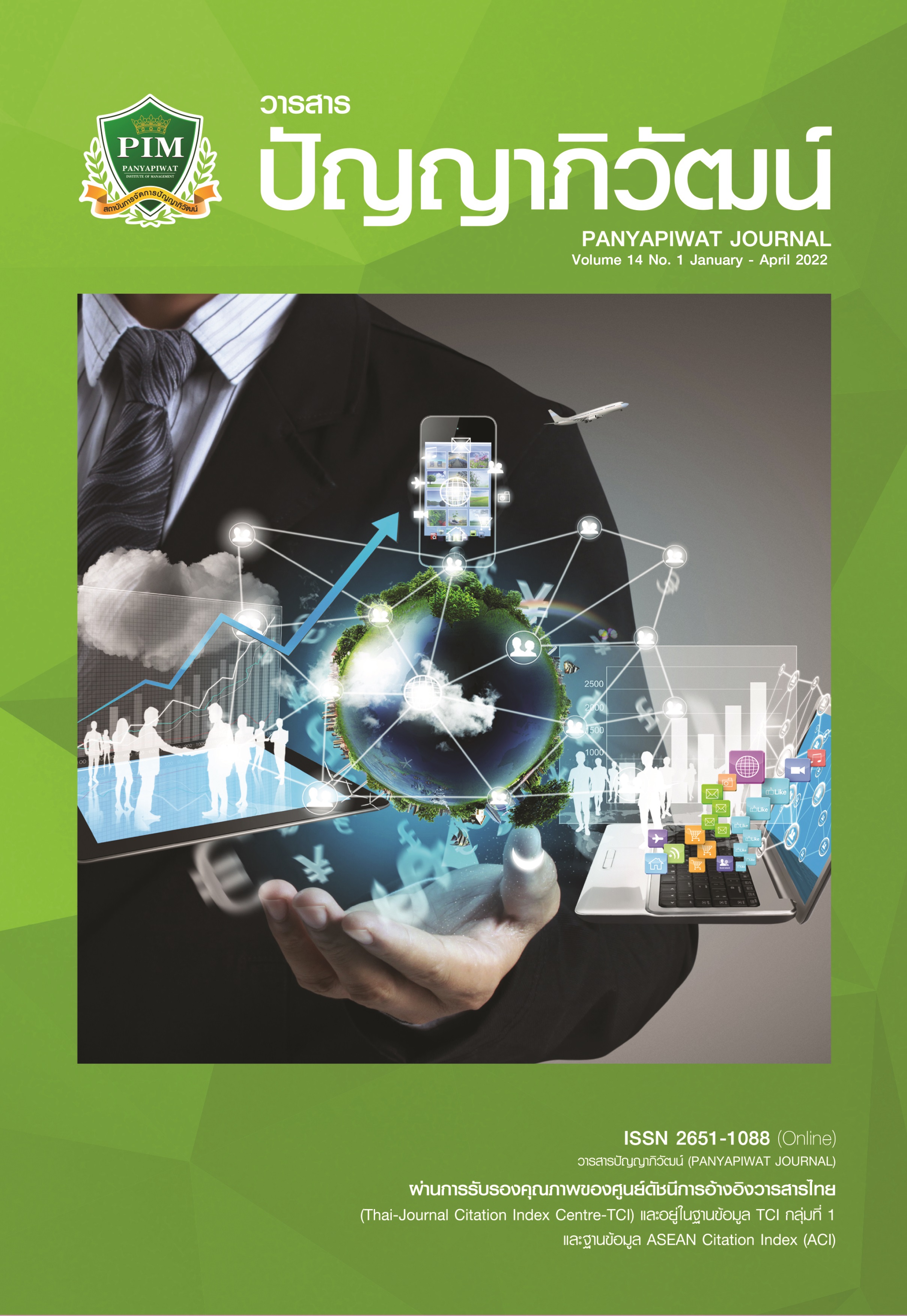การวิเคราะห์องค์ประกอบศักยภาพการจัดการแหล่งท่องเที่ยวเชิงวัฒนธรรมอาหาร มรดกหมูย่างเมืองตรังเพื่อการเรียนรู้บนเศรษฐกิจสร้างสรรค์
Main Article Content
บทคัดย่อ
งานวิจัยนี้มีวัตถุประสงค์เพื่อศึกษาและวิเคราะห์องค์ประกอบศักยภาพการจัดการแหล่งท่องเที่ยวเชิงวัฒนธรรมอาหารมรดกหมูย่างเมืองตรังเพื่อการเรียนรู้บนเศรษฐกิจสร้างสรรค์ เครื่องมือวิจัยเป็นแบบสอบถามกลุ่มตัวอย่างที่ใช้ จำนวน 480 คน เลือกกลุ่มตัวอย่างแบบเจาะจงและแบบบังเอิญ โดยการกำหนดขนาดแหล่งข้อมูลใช้เกณฑ์ 1:20 สถิติที่ใช้ในการวิจัยคือ ค่าร้อยละ ค่าส่วนเบี่ยงเบนมาตรฐาน ค่าเฉลี่ย และการวิเคราะห์องค์ประกอบเชิงสำรวจ ผลการวิจัยพบว่า การวิเคราะห์องค์ประกอบศักยภาพ การจัดการแหล่งท่องเที่ยวมีดังนี้ 1) ศักยภาพการบริหารจัดการด้านท่องเที่ยว ประกอบด้วย 15 ตัวแปร ได้แก่ นโยบายส่งเสริมการท่องเที่ยวความร่วมมือจากหน่วยงาน ความเพียงพอของสาธารณูปโภค บุคลากรมีความพร้อมให้บริการ การใช้ประโยชน์พื้นที่เหมาะสม การติดตามและประเมินผล กิจกรรมท่องเที่ยวที่เหมาะสม มีการสนับสนุนและพัฒนา มีส่วนร่วมของชุมชน การให้ความรู้และสร้างจิตสำนึก มีสาธารณูปโภคพร้อม ชุมชนสามารถสร้างรายได้ การรักษาสภาพและฟื้นฟู มีสาธารณูปโภคที่เอื้ออำนวย ความหลากหลายของกิจกรรม 2) ศักยภาพด้านเอกลักษณ์ทางกายภาพศิลปวัฒนธรรม ประเพณี ขนบธรรมเนียม ในการรองรับการท่องเที่ยว ประกอบด้วย 9 ตัวแปร ได้แก่ การสืบสานวัฒนธรรมประเพณี ความเป็นเอกลักษณ์ของวิถีชีวิต ภูมิปัญญา และองค์ความรู้ ความงดงามทางศิลปวัฒนธรรมความเป็นมาทางประวัติศาสตร์ วัฒนธรรม ประเพณีที่สืบค้นได้ การสืบทอดภูมิปัญญาและองค์ความรู้อย่างต่อเนื่อง การเข้าถึงแหล่งท่องเที่ยวที่สะดวก ความเข้มแข็งในการรักษาเอกลักษณ์ ความผูกพันต่อวิถีชีวิตในชุมชน และความปลอดภัยทางการท่องเที่ยว
Article Details

อนุญาตภายใต้เงื่อนไข Creative Commons Attribution-NonCommercial-NoDerivatives 4.0 International License.
“ข้าพเจ้าและผู้เขียนร่วม (ถ้ามี) ขอรับรองว่า บทความที่เสนอมานี้ยังไม่เคยได้รับการตีพิมพ์และไม่ได้อยู่ระหว่างกระบวนการพิจารณาลงตีพิมพ์ในวารสารหรือแหล่งเผยแพร่อื่นใด ข้าพเจ้าและผู้เขียนร่วมยอมรับหลักเกณฑ์การพิจารณาต้นฉบับ ทั้งยินยอมให้กองบรรณาธิการมีสิทธิ์พิจารณาและตรวจแก้ต้นฉบับได้ตามที่เห็นสมควร พร้อมนี้ขอมอบลิขสิทธิ์บทความที่ได้รับการตีพิมพ์ให้แก่สถาบันการจัดการปัญญาภิวัฒน์หากมีการฟ้องร้องเรื่องการละเมิดลิขสิทธิ์เกี่ยวกับภาพ กราฟ ข้อความส่วนใดส่วนหนึ่งและ/หรือข้อคิดเห็นที่ปรากฏในบทความข้าพเจ้าและผู้เขียนร่วมยินยอมรับผิดชอบแต่เพียงฝ่ายเดียว”
เอกสารอ้างอิง
Anantamongkolkul, C., & Pattanapokinsakul, K. (2019). Creative tourism behaviour of cultural tourists in Phuket. Journal of International and Thai Tourism, 15(2), 1-20. [in Thai]
Boonyapak, W. (1986). The impact of tourism industry in art and cultural heritage. TAT Review Magazine, 4, 31-38. [in Thai]
Chopthamdee, Y., & Sungrugsa, N. (2020). Model of local gastronomy tourism in eastern seaboard area. Dusit Thani College Journal, 13(2), 403-413. [in Thai]
Chunhbunyathip, P. (2017). Community tourism and environmental conservation participation in Nong Chaiwan Wetland Dondeng Village, Srisongkhram District, Nakhon Phanom Province. Journal of International and Thai Tourism, 13(2), 47-62. [in Thai]
Cochran, W. G. (1953). Sampling techniques. John Wiley & Sons.
Cohen, E. (1979). A phenomenology of tourist experience. Sociology, 13, 179-201.
Conbach, L. J. (1984). Essential of psychology and education. Mc-Graw Hill.
Department of Intellectual Property. (2006). Annual report 2006. Department of Intellectual Property. [in Thai]
DP Studio Company Limited. (2009). History/background. http://www.iamtrang.com/detail_page.php?sub_id=12
Hall, M., & Mitchell, R. (2001). Wine and food tourism. In N. Douglas, & R. Derrett (Eds.), Special Interest Tourism. John Wiley.
Jittangwittaya, B. (2005). Tourism industry. Press and Design.
Khittasangkha, M. (2010). The study of managerial potentiality on cultural tourism in upper northern Thailand: Cases of Chiangrai, Chiangmai and Mae Hong Son Provinces. Chiang Rai Rajabhat University. [in Thai]
Krungthai COMPASS. (2020). Penetrating tourist behavior in new normal: When covid changes lives. Krungthai COMPASS.
Likert, S. (1961). New patterns of management. McGraw-Hill.
Ministry of Tourism and Sports. (2019). Tourism statistics 2019. Ministry of Tourism and Sports. [in Thai]
Mohanthy, P., Himanshu, R., & Sapan, S. (2020). Food, culture and tourism: A gastronomical triology enhancing destination marketing, case study of Odisha, India. Research Gate. https://www.researchgate.net/publication/339386956_FoodCulture_Tourism_Final
Pérez Gálvez, J. C., Torres-Matovelle, P., Molina-Molina, G., & González Santa Cruz, F. (2020). Gastronomic clusters in an Ecuadorian tourist destination: The case of the province of Manabí. British Food Journal, 122(12), 3917-3934.
Perreault, W. D., & Dorden, W. R. (1979). A psychological classification of vacation life-styles. Journal of Leisure Research, 9, 208-224.
Phromburom, P., & Kimpakorn, N. (2015). Factors affecting tourist experience of eco, and wellness tourism in the upper northern provincial cluster 1 of Thailand: Chiang Mai, Lamphun, Lampang, Mae Hongson. Journal of Thai Hospitality and Tourism, 10(1), 71-87. [in Thai]
Pratt, S., Suntikul, W., & Agyeiwaah, E. (2020). Determining the attributes of gastronomic tourism experience: Applying impact-range performance and asymmetry analyses. International Journal of Tourism Research, 22(5), 564-581.
Renko, S., Renko, N., & Polonijo, T. (2010). Understanding the role of food in rural tourism development in a recovering economy. Journal of Food Products Marketing, 16, 309-324.
Richards, G. (2021). Evolving research perspectives on food and gastronomic experiences in tourism. 3/2 International Journal of Contemporary Hospitality Management, 33(3), 1037-1058.
Ruangrangsee, N. (1999). Spices. Chulalongkorn University. [in Thai]
Santich, B. (2007). The study of gastronomy: A catalyst cultural understanding.The International Journal of Humanities, 5(6), 53-58.
Sawadee. (2021). Trang guide. http://www.sawadee.co.th/thai/trang/ [in Thai]
Saywichian, P. (2004). Food, culture and health. Chiang Mai University. [in Thai]
Seyitoğlu, F., & Ivanov, S. (2020). A conceptual study of the strategic role of gastronomy in tourism destinations. International Journal of Gastronomy and Food Science, 21, 15-25.
Suansri, P. (2003). Guide for community-based tourism management. Travel for Life Project and Nature. [in Thai]
Suvannin, W., & Colleagues. (2014). A study of cultural tourism potentiality of buddhist temples in Pathum Thani Province. Journal of Graduate Studies Valaya Alongkorn Rajabhat University, 8(3), 63-81. [in Thai]
Tourism Western Australia. (2008). Five a’s of tourism. Tourism Western Australia.
Trang Provincial Cultural Office. (2019). The heritage, wisdom, food that is an indication of thai geographical: Trang roasted pork. http://ich.culture.go.th/index.php/en/articles/946-----m-s [in Thai]
UNESCO. (2006). Tourism, culture and sustainable development. http://whc.unesco.org/sustainabletourismtoolkit/sites/default/files/2
Weiss, C. H. (1972). Evaluation research. Prentice-Hall.
Worakham, P. (2013). Education research. Taxila Printing.
Wutyapatheerakul, S. (2009). Tourism standards raise the quality of tourism. Bangkok Office of Tourism Development for Quality, 15(138), 85-88. [in Thai]


